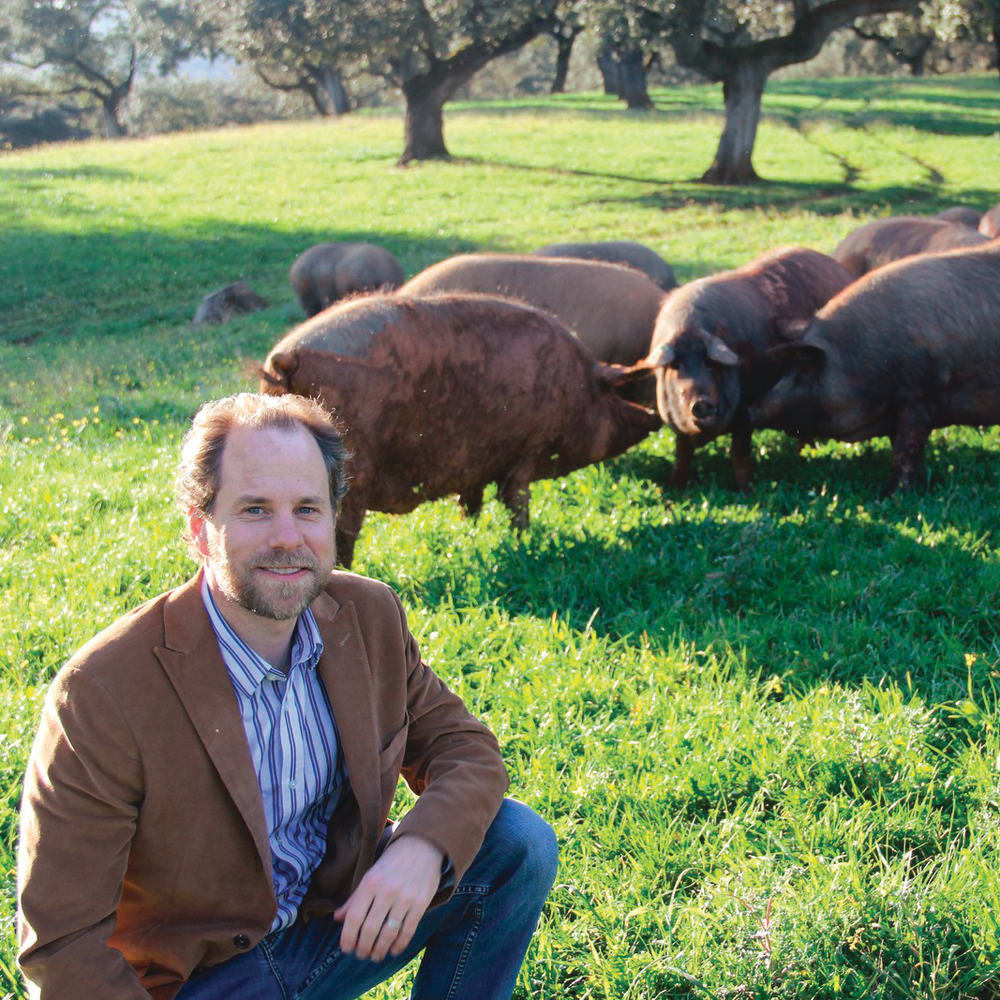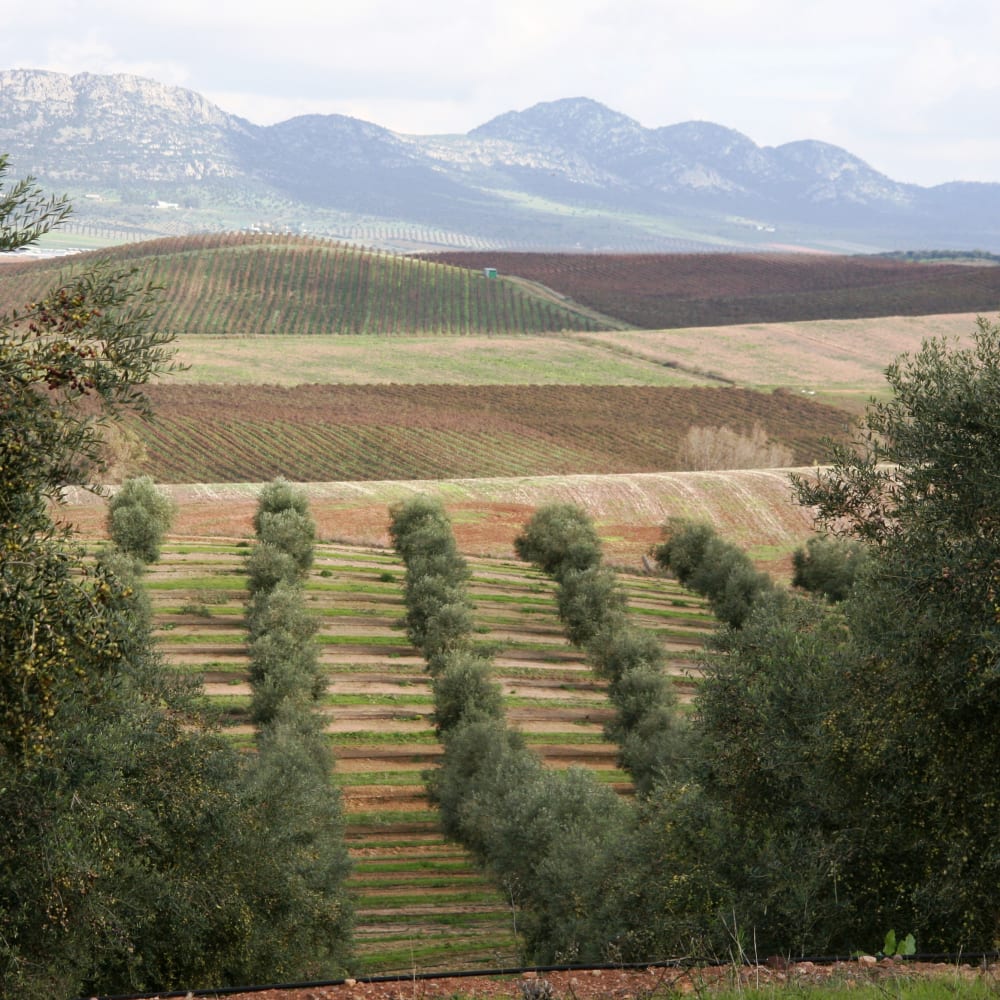Free Tuna with $75 Orders! Promo Code: TUNA
Latest News from Spain - Piles of Acorns, Droughts and Floods, Madrid Rocks
Jonathan Harris | April 2024




The culture and cuisine of Spain is constantly changing, and I'd like to keep you up to date on the latest developments. This week, learn about a bumper acorn crop for Ibérico pigs, the effects of climate change on artisan products, booming Madrid food culture, and the threat of corporate domination of Spain's food industry, and how we can help.
First some good news, Spain has acorns aplenty! Spain’s iconic Jamón Ibérico de Bellota hams come from Ibérico breed pigs that live in the vast dehesa forest rangeland of southern Spain. We visited a small herd of these special animals near the town of Jabugo, where they were munching on nutritious herbs and grasses. In the winter, during the montanera, they feast on rich, sweet acorns from the abundant encina oaks and alcornoque cork trees that dot the landscape.
These antioxidant rich acorns combine with the special Ibérico genetics, plentiful exercise and expert curing techniques to create a miraculous recipe! The fat in a Bellota ham is so rich in healthy oleic acid that it is comparable to quality extra virgin olive oil. Because of this, a slice of Jamón Ibérico de Bellota will start melting in your mouth as you eat it. Tip: if you want to test a Bellota ham for quality, press a fatty area with your thumb. On an excellent jamón, the fat will literally melt with liquid goodness.
This year the montanera was spectacular, with huge amounts of acorns falling from the trees. Rains and moderate temperatures have meant lots of quality grasses, which are a key food source that provides plenty of antioxidants. The good weather has kept the oak trees healthy, which paired with a peak in the cyclical acorn crop to produce the best season in over ten years.
What does this mean? More purebred Ibérico pigs feasted on more high-quality acorns, creating more top-quality pork for the finest hams. And the more great hams that are available, the more profitable it is to raise these pigs wild on this beautiful landscape. Every euro or dollar spent on Jamón Ibérico de Bellota is a donation to the preservation of this ancient ecosystem and the ham tradition that it sustains. So, eat lots of Bellota ham – it is good for you and the world!
The second set of news is less positive - the effect of climate change on artisans across Spain, and why we need to support them. Most of Spain has not been as fortunate as the dehesa forests recently. Eastern Spain and Andalucía continue to suffer from a brutal multiyear drought and soaring temperatures. Even the hearty olive trees that blanket the countryside are suffering.
We visited an olive farmer near Sevilla, and he showed us how the trees are unable to produce the same volume and quality of olives because of drought stress. Even with irrigation, the trees do not thrive, because they naturally prefer to tap into moisture deep underground.
The result has been struggling olive farmers, lower yields and much higher prices for quality extra virgin olive oil. The industrial producers will moderate the prices by selling cheap, low-quality oil seasoned with a dash of the good stuff. Our small family producers care about quality and will not cheat, so the prices of their excellent extra virgin olive oils will be significantly higher in the coming years. We are committed to supporting them through this challenging time – paying for high quality olive oil will help the traditional small producers survive and prosper. Plus, the flavor and quality are so much better.
Traditional Manchego is also getting dearer, as the drought means less wild forage for the Manchega sheep to eat. At the same time, this famous cheese is becoming very popular around the world and there just isn’t enough to go around. Giant producers are buying up all the milk, including from industrial farms, and producing mediocre quality cheeses to cash in. Guess who gets hurt in this scenario? The small family producers, like our friends at Villajos, and the ancient traditional methods that produce the best quality. Again, we will only offer authentic Manchego, and it is worth every penny!
Bizarrely, the verdant region of Galicia in the northwest of Spain has the opposite problem – too much rain. Our partners in the region harvest shellfish that depend on the rich waters of the Atlantic to fill the Rias, or narrow estuaries, with seawater and microorganisms that feed the mussels and clams. But when there is a deluge, the Rias fill with fresh water, decreasing the salinity and nutrients. The berberechos, clams and mussels are slow to grow and there is a much smaller harvest of quality shellfish to pack by hand at the small local canneries. We could find cheaper low-quality shellfish imported from places like Asia, but we are committed to supporting the local family industries.
Finally, some much better news. Madrid rocks! This is not news to many of us, but the capital city is finally getting the recognition it deserves. The city has had a makeover, with dozens of new hotels and restaurants, along with amazing shopping districts (it seems like there is a hip Zara shop on every corner in some areas.) Madrid has always been a blend of old and new, and now you can visit a trendy zen-style coffee shop (not my favorite, but to each his own) just down the street from a rustic café/bar where you can eat fresh churros and chocolate in a delightfully chaotic atmosphere. Then there are the museums and markets, parks and promenades – a seemingly endless number of fun activities to explore. Barcelona has long enticed the majority of travelers, but Madrid is finally getting its due.
Spain experiences change and challenges, like everywhere. Our mission is to work with artisan suppliers to help bring the very best foods and cookware for you to enjoy. Understanding the changing landscape of the Spanish food world helps us support the quality food traditions that we love so much.
¡Abrazos! - Jonathan, La Tienda

¡Hola! I'm Jonathan Harris, one of the owners of La Tienda. I love sharing insights about Spain's amazing food culture.
Learn more >

